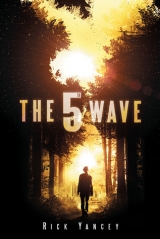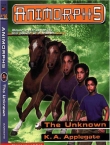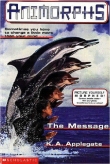
Текст книги "The 5th Wave"
Автор книги: Rick Yancey
Жанры:
Подростковая литература
,сообщить о нарушении
Текущая страница: 14 (всего у книги 27 страниц)


HERE’S A TYPICAL day in the atypical new reality of Camp Haven.
5:00 A.M.: Reveille and wash up. Dress and prep bunks for inspection.
5:10 A.M.: Fall in. Reznik inspects our billets. Finds a wrinkle in someone’s sheet. Screams for twenty minutes. Then picks another recruit at random and screams for another twenty for no real reason. Then three laps around the yard freezing our asses off, me urging Oompa and Nugget to keep up or I get to run another lap as the last man to finish. The frozen ground beneath our boots. Our breaths frosting in the air. The twin columns of black smoke from the power plant rising beyond the airfield and the rumble of buses pulling out of the main gate.
6:30 A.M.: Chow in the crowded mess hall that smells faintly like soured milk, reminding me of the plague and the fact that once upon a time I thought about just three things—cars, football, and girls, in that order. I help Nugget with his tray, urging him to eat because, if he doesn’t eat, boot camp will kill him. Those are my exact words: Boot camp will kill you. Tank and Flintstone laugh at me mothering Nugget. Already calling me Nugget’s Nanna. Screw them. After chow we check out the leaderboard. Every morning the scores from the previous day are posted on a big board outside the mess hall. Points for marksmanship. Points for best times on the obstacle course, the air raid drills, the two-mile runs. The top four squads will graduate at the end of November, and the competition is fierce. Our squad’s been stuck in tenth place for weeks. Tenth isn’t bad, but it’s not good enough.
7:30 A.M.: Training. Weapons. Hand-to-hand. Basic wilderness survival. Basic urban survival. Recon. Communications. My favorite is survival training. That memorable session where we had to drink our own urine.
12:00 P.M.: Noon chow. Some mystery meat between hard crusts of bread. Dumbo, whose jokes are as tasteless as his ears are big, cracks that we’re not incinerating the infested bodies but grinding them up to feed the troops. I have to pull Teacup off him before she smacks his head with a tray. Nugget stares at his burger like it might jump off his plate and bite his face. Thanks, Dumbo. The kid’s skinny enough as it is.
1:00 P.M.: More training. Mostly on the firing range. Nugget is issued a stick for a rifle and fires pretend rounds while we fire real ones into life-size plywood cutouts. The crack of the M16s. The screech of plywood being shredded. Poundcake earns a perfect score; I’m the worst shot in the squad. I pretend the cutout is Reznik, hoping that will improve my aim. It doesn’t.
5:00 P.M.: Evening chow. Canned meat, canned peas, canned fruit. Nugget pushes his food around and then bursts into tears. The squad glares at me. Nugget is my responsibility. If Reznik comes down on us for conduct unbefitting, there’s hell to pay, and I’m picking up the tab. Extra push-ups, reduced rations—he could even deduct some points. Nothing matters but getting through basic with enough points to graduate, get out into the field, rid ourselves of Reznik. Across the table, Flintstone is glowering at me from beneath the unibrow. He’s pissed at Nugget, but more pissed at me for taking his job. Not that I asked for squad leader. He came at me after that day and growled, “I don’t care what you are now, I’m gonna make sergeant when we graduate.” And I’m like, “More power to you, Flint.” The idea of my leading a unit into combat is ludicrous. Meanwhile, nothing I say calms Nugget down. He keeps going on about his sister. About how she promised to come for him. I wonder why the commander would stick a little kid who can’t even lift a rifle into our squad. If Wonderland winnowed out the best fighters, what sort of profile did this little guy produce?
6:00 P.M.: Drill instructor Q&A in the barracks, my favorite part of the day, where I get to spend some quality time with my favorite person in the whole wide world. After informing us what worthless piles of desiccated rat feces we are, Reznik opens the floor for questions and concerns.
Most of our questions have to do with the competition. Rules, procedures in case of a tie, rumors about this or that squad cheating. Making the grade is all we can think about. Graduation means active duty, real fighting—a chance to show the ones who died that we had not survived in vain.
Other topics: the status of the rescue and winnowing operation (code name Li’l Bo Peep; I’m not kidding). What news from the outside? When will we hunker full-time in the underground bunker, because obviously the enemy can see what we’re doing down here and it’s only a matter of time before they vaporize us. For that we get the standard-issue reply: Commander Vosch knows what he’s doing. Our job isn’t to worry about strategy and logistics. Our job is to kill the enemy.
8:30 P.M.: Personal time. Free of Reznik at last. We wash our jumpsuits, shine our boots, scrub the barracks floor and the latrine, clean our rifles, pass around dirty magazines, and swap other contraband like candy and chewing gum. We play cards and bust each other’s nuts and complain about Reznik. We share the day’s rumors and tell bad jokes and push back against the silence inside our own heads, the place where the never-ending voiceless scream rises like the superheated air above a lava flow. Inevitably an argument erupts and stops just short of a fistfight. It’s tearing away at us. We know too much. We don’t know enough. Why is our regiment composed entirely of kids like us, no one over the age of eighteen? What happened to all the adults? Are they being taken somewhere else and, if they are, where and why? Are the Teds the final wave, or is there another one coming, a fifth wave that will make the first four pale in comparison? Thinking about a fifth wave shuts down the conversation.
9:30 P.M.: Lights-out. Time to lie awake and think of a wholly new and creative way to waste Sergeant Reznik. After a while I get tired of that and think about the girls I’ve dated, shuffling them around in various orders. Hottest. Smartest. Funniest. Blondes. Brunettes. Which base I got to. They start to blend together into one girl, the Girl Who Is No More, and in her eyes Ben Parish, high school hallway god, lives again. From its hiding place under my bunk, I pull out Sissy’s locket and press it against my heart. No more guilt. No more grief. I will trade my self-pity for hate. My guilt for cunning. My grief for the spirit of vengeance.
“Zombie?” It’s Nugget in the bunk next to me.
“No talking after lights-out,” I whisper back.
“I can’t sleep.”
“Close your eyes and think of something nice.”
“Can we pray? Is that against the rules?”
“Sure you can pray. Just not out loud.”
I can hear him breathing, the creak of the metal frame as he flips and flops around on the bunk.
“Cassie always said my prayer with me,” he confesses.
“Who’s Cassie?”
“I told you.”
“I forgot.”
“Cassie’s my sister. She’s coming for me.”
“Oh, sure.” I don’t tell him that if she hasn’t shown up by now, she’s probably dead. It isn’t up to me to break his heart; that’s time’s job.
“She’s promised. Promised.”
A tiny hiccup of a sob. Great. Nobody knows for sure, but we accept it as fact that the barracks are bugged, that every second Reznik is spying on us, waiting for us to break one of the rules so he can bring the hammer down. Violating the no-talking rule at lights-out will earn all of us a week of kitchen patrol.
“Hey, it’s all right, Nugget…”
Reaching my hand out to comfort him, finding the top of his freshly shaved head, running my fingertips over his scalp. Sissy liked for me to rub her head when she felt bad—maybe Nugget likes it, too.
“Hey, stow that over there!” Flintstone calls out softly.
“Yeah,” Tank says. “You wanna get us busted, Zombie?”
“Come here,” I whisper to Nugget, scooting over and patting the mattress. “I’ll say your prayer with you, and then you can go to sleep, okay?”
The mattress gives with his added weight. Oh God, what am I doing? If Reznik pops in for a surprise inspection, I’ll be peeling potatoes for a month. Nugget lies on his side facing me, and his fists rub against my arm as he brings them up to his chin.
“What prayer does she say with you?” I ask.
“‘Now I lay me,’” he whispers.
“Somebody put a pillow over that nugget’s face,” Dumbo says from his bunk.
I can see the ambient light shining in his big brown eyes. Sissy’s locket pressed against my chest and Nugget’s eyes, glittering like twin beacons in the dark. Prayers and promises. The one his sister made to him. The unspoken one I made to my sister. Prayers are promises, too, and these are the days of broken promises. All of a sudden I want to put my fist through the wall.
“‘Now I lay me down to sleep, I pray the Lord my soul to keep.’”
He joins in on the next line.
“‘When in the morning light I wake, teach me the path of love to take.’”
The hisses and shushes pick up on the next stanza. Somebody hurls a pillow at us, but we keep praying.
“‘Now I lay me down to sleep, I pray the Lord my soul to keep. Your angels watch me through the night, and keep me safe till morning’s light.’”
On angels watch me, the hissing and shushing stops. A profound stillness settles over the barracks.
Our voices slow on the last stanza. Like we’re reluctant to finish because on the other side of a prayer is the nothingness of another exhausted sleep and then another day waiting for the last day, the day we will die. Even Teacup knows she probably won’t live to see her eighth birthday. But we’ll get up and put ourselves through seventeen hours of hell anyway. Because we will die, but at least we will die unbroken.
“‘And if I should die before I wake, I pray the Lord my soul to take.’”


THE NEXT MORNING I’m in Reznik’s office with a special request. I know what his answer’s going to be, but I’m asking anyway.
“Sir, the squad leader requests that the senior drill instructor grant Private Nugget a special exemption from this morning’s detail.”
“Private Nugget is a member of this squad,” Reznik reminds me. “And as a member of this squad, he is expected to perform all duties assigned by Central Command. All duties, Private.”
“Sir, the squad leader requests that the senior drill instructor reconsider his decision based on Private Nugget’s age and—”
Reznik dismisses the point with a wave of his hand. “The boy didn’t drop out of the damned sky, Private. If he didn’t pass his prelims, he wouldn’t have been assigned to your squad. But the fact of the matter is he did pass his prelims, he was assigned to your squad, and he will perform all duties of your squad as assigned by Central Command, including P and D. Are we clear, Private?”
Well, Nugget, I tried.
“What’s P and D?” he asks at morning chow.
“Processing and disposal,” I answer, cutting my eyes away from him.
Across from us, Dumbo groans and pushes his tray away. “Great. The only way I can get through breakfast is by not thinking about it!”
“Churn and burn, baby,” Tank says, glancing at Flintstone for approval. Those two are tight. On the day Reznik gave me the job, Tank told me he didn’t care who was squad leader, he’d only listen to Flint. I shrugged. Whatever. Once we graduated—if we ever graduated—one of us would be promoted to sergeant, and I knew that someone would not be me.
“Dr. Pam showed you a Ted,” I say to Nugget. He nods. From his expression, I can tell it isn’t a pleasant memory. “You hit the button.” Another nod. Slower than the first one. “What do you think happens to the person on the other side of the glass after you hit the button?”
Nugget whispers, “They die.”
“And the sick people they bring in from the outside, ones that don’t make it once they get here—what do you think happens to them?”
“Oh, come on, Zombie, just tell him!” Oompa says. He’s pushed away his food, too. A first for him. Oompa is the only one in the squad who ever goes back for seconds. To put it in the nicest way, the food in camp sucks.
“It isn’t something we like to do, but it has to be done,” I say, echoing the company line. “Because this is war, you know? It’s war.”
I look down the table for support. The only one who will make eye contact with me is Teacup, who is nodding happily.
“War,” she says. Happily.
Outside the mess hall and across the yard, where several squads are drilling under the watchful eyes of their drill sergeants, Nugget trots along beside me. Zombie’s dog, the squad calls him behind his back. Cutting between Barracks 3 and 4 to the road that leads to the power plant and the processing hangars. The day is cold and cloudy; it feels like it might snow. In the distance, the sound of a Black Hawk taking off and the sharp tat-tat-tat of automatic weapons’ fire. Directly in front of us the twin towers of the plant belching black and gray smoke. The gray smoke fades into the clouds. The black lingers.
A large white tent has been set up outside the entrance to the hangar, the staging area festooned with red-and-white biohazard warning signs. Here we suit up for processing. Once I’m dressed, I help Nugget with his orange suit, the boots, the rubber gloves, the mask, and the hood. I give him the lecture about never, ever taking off any part of his suit inside the hangar, under any circumstances, ever. He has to ask permission before handling anything and, if he has to leave the building for any reason, he has to decon and pass inspection before reentering.
“Just stick with me,” I tell him. “It’ll be okay.”
He nods and his hood bounces back and forth, the faceplate smacking him in the forehead. He’s trying to hold it together, and it’s not going well. So I say, “They’re just people, Nugget. Just people.”
Inside the processing hangar, the bodies of the just-people are sorted, the infected from the clean—or, as we call them, the Ted from the unTed. Teds are marked with bright green circles on their foreheads, but you rarely need to look; the Teds are always the freshest bodies.
They’ve been stacked against the back wall, waiting for their turn to be laid out on the long metal tables that run the length of the hangar. The bodies are in various stages of decay. Some are months old. Some look fresh enough to sit up and wave hello.
It takes three squads to work the line. One squad carts the bodies over to the metal tables. Another processes. A third carries the processed corpses to the front and stacks them for pickup. You rotate the duties to help break up the monotony.
Processing is the most interesting, and where our squad begins. I tell Nugget not to touch, just watch me until he gets the idea.
Empty the pockets. Separate the contents. Trash goes in one bin, electronics in another, precious metals in a third, all other metals in a fourth. Wallets, purses, paper, cash—all trash. Some of the squads can’t help themselves—old habits die hard—and walk around with wads of useless hundred-dollar bills stuffed in their pockets.
Photographs, IDs, any little memento that isn’t made of ceramic—trash. Almost without exception, from the oldest to the youngest, the pockets of the dead are filled to the brim with the strangest things only the owners could understand the value for.
Nugget doesn’t say a word. He watches me work down the line, keeping right beside me as I sidestep to the next body. The hangar is ventilated, but the smell is overpowering. Like any omnipresent smell—or rather, like anything omnipresent—you get used to it; you stop smelling it after a while.
Same is true for your other senses. And your soul. After you’ve seen your five hundredth dead baby, how can you be shocked or sickened or feel anything at all?
Beside me, Nugget is silent, watching.
“Tell me if you’re going to be sick,” I tell him sternly. It’s horrible throwing up in your suit.
The overhead speakers pop to life, and the tunes begin. Most of the guys prefer rap while they process; I like to mix it up with a little heavy metal and some R&B. Nugget wants something to do, so I have him carry the ruined clothes to the laundry bins. They’ll be burned with the processed corpses later that night. Disposal happens next door, in the power plant incinerator. They say the black smoke is from the coal and the gray smoke is from the bodies. I don’t know if that’s true.
It’s the hardest processing I’ve done. I’ve got Nugget, my own bodies to process, and the rest of the squad to keep an eye on, because there’s no drill sergeants or any adult period inside the processing hangar, except the dead ones. Just kids, and sometimes it’s like at school when the teacher is suddenly called out of the room. Things can get crazy.
There’s little interaction among the squads outside P&D. The competition for the top slots on the leaderboard is too intense, and there’s nothing friendly about the rivalry.
So when I see the fair-skinned, dark-haired girl wheeling corpses from Poundcake’s table to the disposal area, I don’t go over and introduce myself and I don’t grab one of her team members to ask her name. I just watch her while I dig my fingers through the pockets of dead people. I notice she’s directing traffic at the door; she must be the squad leader. At the midmorning break, I pull Poundcake aside. He’s a sweet kid, quiet, but not in a weird way. Dumbo has a theory that one day the cork will pop and Poundcake won’t stop talking for a week.
“You know that girl from Squad Nineteen working at your table?” I ask him. He nods. “Know anything about her?” He shakes his head. “Why am I asking you this, Cake?” He shrugs. “Okay,” I say. “But don’t tell anyone I asked.”
By the fourth hour on the line, Nugget’s not too steady on his feet. He needs a break, so I take him outside for a few minutes, where we sit against the hangar door and watch the black and gray smoke billowing beneath the clouds.
Nugget yanks off his hood and leans his head against the cold metal door, his round face shiny with sweat.
“They’re just people,” I say again, basically because I don’t know what else to say. “It gets easier,” I go on. “Every time you do it, you feel it a little less. Until it’s like—I don’t know—like making your bunk or brushing your teeth.”
I’m all tense, waiting for him to lose it. Cry. Run. Explode. Something. But there’s just this blank, faraway look in his eyes, and suddenly I’m the one about to explode. Not at him. Or at Reznik for making me bring him. At them. At the bastards who did this to us. Forget about my life—I know how that ends. What about Nugget’s? Five frigging years old, and what’s he got to look forward to? And why the hell did Commander Vosch assign him to a combat unit? Seriously, he can’t even lift a rifle. Maybe the idea is to catch ’em young, train ’em from the ground up. So by the time he’s my age you don’t have a stone-cold killer, but an ice-cold one. One with liquid nitrogen for blood.
I hear his voice before I feel his hand on my forearm. “Zombie, are you okay?”
“Sure, I’m fine.” Here’s a strange turn of events, him worried about me.
A large flatbed pulls up to the hangar door, and Squad 19 begins loading bodies, tossing them onto the truck like relief workers heaving sacks of grain. There’s the dark-haired girl again, straining at the front end of a very fat corpse. She glances our way before going back inside for the next body. Great. She’ll probably report us for goofing off to knock a few points off our score.
“Cassie says it won’t matter what they do,” Nugget says. “They can’t kill all of us.”
“Why can’t they?” Because, kid, I’d really, really like to know.
“Because we’re too hard to kill. We’re invista…investra…invinta…”
“Invincible?”
“That’s it!” With a reassuring pat on my arm. “Invincible.”
Black smoke, gray smoke. And the cold biting our cheeks and the heat from our bodies trapped inside our suits, Zombie and Nugget and the brooding clouds above us and, hidden above them, the mothership that gave birth to the gray smoke and, in a way, to us. Us too.


EVERY NIGHT NOW Nugget crawls into my bunk after lights-out to say his prayer, and I let him stay until he falls asleep. Then I carry him back to his bunk. Tank threatens to turn me in, usually after I give him an order he doesn’t like. But he doesn’t. I think he secretly looks forward to prayer time.
It amazes me how quickly Nugget has adjusted to camp life. Kids are like that, though. They can get used to practically anything. He can’t lift a rifle to his shoulder, but he does everything else, and sometimes better than the older kids. He’s faster than Oompa on the obstacle course and a quicker study than Flintstone. The one squad member who can’t stand him is Teacup. I guess it’s jealousy: Before Nugget came, Teacup was the baby of the family.
Nugget did have a mini freakout during his first air raid drill. Like the rest of us, he had no idea it was coming, but unlike the rest of us, he had no idea what the hell was going on.
It happens once a month and always in the middle of the night. The sirens scream so loud, you can feel the floor shaking under your bare feet as you stumble around in the dark, yanking on jumpsuit and boots, grabbing your M16, racing outside as all the barracks empty out, hundreds of recruits pouring across the yard toward the access tunnels that lead underground.
I was a couple of minutes behind the squad because Nugget was hollering his head off and clinging to me like a monkey to his momma, thinking any minute the alien warships would start dropping their payloads.
I shouted at him to calm down and follow my lead. It was a waste of breath. Finally I just picked him up and slung him over my shoulder, rifle clutched in one hand, Nugget’s butt in the other. As I sprinted outside, I thought of another night and another screaming kid. The memory made me run harder.
Into the stairwell, down the four flights of stairs awash in yellow emergency light, Nugget’s head popping against my back, then through the steel-reinforced door at the bottom, down a short passageway, through the second reinforced door, and into the complex. The heavy door clanged shut behind us, sealing us inside. By now he had decided he might not be vaporized after all, and I could set him down.
The shelter is a confusing maze of dimly lit intersecting corridors, but we’ve been drilled so much, I could find my way to our station with my eyes closed. I yelled over the siren for Nugget to follow me and I took off. A squad heading in the opposite direction thundered past us.
Right, left, right, right, left, into the final passageway, my free hand gripping the back of Nugget’s neck to keep him from falling back. I could see my squad kneeling twenty yards from the back wall of the dead-end tunnel, their rifles trained at the metal grate that covers the airshaft leading to the surface.
And Reznik standing behind them, holding a stopwatch.
Crap.
We missed our time by forty-eight seconds. Forty-eight seconds that would cost us three days of free time. Forty-eight seconds that would drop us another place on the leaderboard. Forty-eight seconds that meant God knows how many more days of Reznik.
Back in the barracks now, we’re all too hyped up to sleep. Half the squad is pissed at me, the other half is pissed at Nugget. Tank, of course, blames me.
“You should have left him behind,” he says. His thin face is flushed with rage.
“There’s a reason we drill, Tank,” I remind him. “What if this had been the real thing?”
“Then I guess he’d be dead.”
“He’s a member of this squad, same as the rest of us.”
“You still don’t get it, do you, Zombie? It’s freakin’ nature. Whoever’s too sick or weak has to go.” He yanks off his boots, hurls them into his locker at the foot of the bunk. “If it was up to me, we’d throw all of ’em into the incinerator with the Teds.”
“Killing humans—isn’t that the aliens’ job?”
His face is beet red. He pounds the air with his fist. Flintstone makes a move to calm him down, but Tank waves him away.
“Whoever’s too weak, too sick, too old, too slow, too stupid, or too little—they GO!” Tank yells. “Anybody and everybody who can’t fight or support the fight—they’ll just drag us down.”
“They’re expendable,” I shoot back sarcastically.
“The chain is only as strong as the weakest link,” Tank roars. “It’s frickin’ nature, Zombie. Only the strong survive!”
“Hey, come on, man,” Flintstone says to him. “Zombie’s right. Nugget’s one of the crew.”
“You get off my case, Flint,” Tank shouts. “All of you! Like it’s my fault. Like I’m responsible for this shit!”
“Zombie, do something,” Dumbo begs me. “He’s going Dorothy.”
Dumbo’s referring to the recruit who snapped on the rifle range one day, turning her weapon on her own squad members. Two people were killed and three seriously injured before the drill sergeant popped her in the back of the head with his sidearm. Every week there’s a story about someone “going Dorothy,” or sometimes we say “off to see the wizard.” The pressure gets to be too much, and you break. Sometimes you turn on others. Sometimes you turn on yourself. Sometimes I question the wisdom of Central Command, putting high-powered automatic weapons into the hands of some seriously effed-up children.
“Oh, go screw yourself,” Tank snarls at Dumbo. “Like you know anything. Like anybody knows anything. What the hell are we doing here? You want to tell me, Dumbo? How about you, squad leader? Can you tell me? Somebody better tell me and they better tell me right now, or I’m taking this place out. I’m taking all of it and all of you out, because this is seriously messed up, man. We’re going to take them on, the things that killed seven billion of us? With what? With what?” Pointing the end of his rifle at Nugget, who’s clinging to my leg. “With that?” Laughing hysterically.
Everybody goes stiff when the gun comes up. I hold up my empty hands and say as calmly as I can, “Private, lower that weapon right now.”
“You’re not the boss of me! Nobody’s the boss of me!” Standing beside his bunk, the rifle at his hip. On the yellow brick road, all right.
My eyes slide over to Flintstone, who’s the closest to Tank, standing a couple of feet to his right. Flint answers with the tiniest of nods.
“Don’t you dumbasses ever wonder why they haven’t hit us yet?” Tank says. He’s not laughing now. He’s crying. “You know they can. You know they know we’re here, and you know they know what we’re doing here, so why are they letting us do it?”
“I don’t know, Tank,” I say evenly. “Why?”
“Because it doesn’t matter anymore what the hell we do! It’s over, man. It’s done!” Swinging his gun around wildly. If it goes off…“And you and me and everybody else on this damn base are history! We’re—”
Flint’s on him, ripping the rifle from his hand and shoving him down hard. Tank’s head catches the edge of his bunk when he falls. He curls into a ball, holding his head in both hands, screaming at the top of his lungs, and when his lungs are empty, he fills them and lets loose again. Somehow it’s worse than waving around the loaded M16. Poundcake races into the latrine to hide in one of the stalls. Dumbo covers his big ears and scoots to the head of his bunk. Oompa has sidled closer to me, right next to Nugget, who’s holding on to my legs with both hands now and peeking around my hip at Tank writhing on the barracks floor. The only one unaffected by Tank’s meltdown is Teacup, the seven-year-old. She’s sitting on her bunk staring stoically at him, like every night Tank falls to the floor and screams as if he’s being murdered.
And it hits me: This is murder, what they’re doing to us. A very slow, very cruel murder, killing us from our souls outward, and I remember the commander’s words: It isn’t about destroying our capability to fight so much as crushing our will to fight.
It is hopeless. It is crazy. Tank is the sane one because he sees it clearly.
Which is why he has to go.








